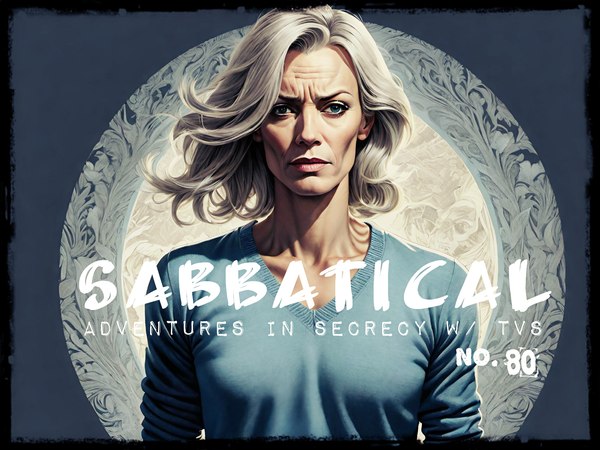Prospero’s Books
Story paths: me & you, dreams
There are two characters named Umberto in these books, I say. One of them—the one who appears first, in the second book, These Are the Things I Know—is a friend of mine who is a powerful sorcerer living in the same city as I am in the 32C. He belongs to the part of the continuity that precedes the destruction of the universe. So that’s the first Umberto.
The second Umberto, who is introduced elliptically in the eighth book, The Stars Call Us Home, is my maternal uncle through my mother’s sister, Gail. He is present in both the pre-destruction timeline and in the reconstituted universe, particularly in the twelfth book, T Van Santana & The Codex of Coherence.
I pause, pull out a Yellow Kid cig, fire it up, take a drag.
After the exhale, I say, “All of this in the oh-gee continuity, you know, the ‘self-loathing continuity.’”
You might know what that means. But it occurs to me that you probably don’t.
So, smoking throughout, I elaborate: “I really detest the whole idea of continuity and canonicity. It destroys art. But I get it, right. Some folks are concrete thinkers and their brains can’t handle not having hooks to hang things on. No shade to them, it’s just kind of the opposite to me. Like that shit is suffocating. So the way I split the diff on this was to have all the continuity errors I make be the actual timeline. The timeline itself—which is conscious, or you know, semi-conscious—is embarrassed that it is not flawless and perfect and completely sensible and immaculately plotted, so it experiences self-loathing over these imperfections.”
You say whatever you think about that, or you don’t say anything.
I flick the cigarette away as the bus arrives on Somatic Avenue, and we climb abroad.
We sit down next to each other. I snuggle your arm a little, then say to you in a quieter voice, my breath stinking of tobacco and coffee, “Then I destroyed the universe. Not, you know personally, but I kind of gave the order to destroy it. A new universe formed, of course, cos you can’t actually destroy anything. Irreducibility of matter and all that yada. The new timeline I call the kaleidoscopic timeline, and it’s a bit more flexible. Like, anyway you turn it, you can get a new timeline or continuity or whatever out of it. They’re all true, and they’re all real, making them all ‘canon’ or whatever. But you can kina pick the one you like best.” I lower my jaw and look up at you, my head shaking a bit as I say, “Which, you know, is what everyone does anyway.”
If you have something to say about this—about continuity and canonicity in general, or mine in particular—you say it now, and I listen attentively as the bus hums us along through the Lost City of Soma, the city within my bodily cells.
I look at you with a bit of bedroom eyes–if we have that kind of relationship, that is–and say, “This is why you’re here with me.” And I might kiss you then, if that’s something you want.
The bus stops humming cos we have arrived, so we disembark.
A chilly wind whips through the street.
If you look for a sign, you see one, reading: HILLOCK PATH.
I nod with my head toward a footpath off the road.
Should you look down it, you’ll see that it winds into the woods rather quickly.
If not, you simply accompany me, and we follow it, bending out of sight from the road almost immediately.
The path has stones along its edge. They are simply placed.
You notice them.
As we go, you see in their stead stones that are stacked.
I smile at you.
We keep going, and the stones here look more like simple sculptures—not quite discernible figures but with some suggestive shape.
“You get it, right?” I ask.
And whether you do or do not, you soon see what I meant by question as the simple sculptures become recognizable, adding more and more detail with each step we take.
We reach the mouth of a cave.
Vines hang down, and I brush them aside like door beads.
Inside the cave, there is an entry shrine.
I take a step past it, then say, “Oh, shit,” and hurry back to it, make a gesture with my hand and touch a small statue there, which sits over a bowl of water.
You do whatever you do or do not do.
Deeper into the cave, you see that there is a library here. It’s sufficiently lit, though the source of light isn’t immediately evident.
“Hey, Tee,” a man says and gives a stiff wave. He’s wearing a necklace made of bones and shells.
I smile and wave. “Hey, Bert,” I say.
He notices you, then, and awkwardly turns around and pulls a book from a shelf, opens it, starts reading.
“That’s Umberto,” I whisper to you. “The friend, not my uncle. Remember?”
If you do, you’re good. If not, reread the first couple paragraphs of this chapter.
If you are familiar with the ending of These Are the Things I Know, you may have concerns. Should you express them to me, I wave them away.
“That was the first timeline, remember?” I say.
If you do, you’re good. If not, reread the paragraph right after we boarded the bus and I explained the timelines.
Irrespective of what you do, it’s clear that I am not worried about Umberto, and I search the selves with my eyes, my hands folded under my arms as I look.
You might notice that something catches my eye.
“This is the same place as the chapel,” I say. Then I point at the back wall of the cave library. “That’s the same wall as the hotel chapel, the one that goes out to the courtyard. Remember?”
If you were with me in that dream, then perhaps you do. If not, that’s fine, too.
“Doesn’t matter,” I say. “Just an interesting detail. Nothing world-shaking.” And I go back to looking at the book spines.
We reach a large section of books, and all the spines look the same.
“Oooo!” I say, and fan my slender fingers. “Now this is a decent find.” I hunker on my haunches and examine the spines more closely.
You look at the books, if you want.
If you can read the spines, then you do, in sequence:
- A Book of Water
- A Book of Mirrors
- A Book of Mythologies
- A Primer of the Small Stars
- An Atlas Belonging to Orpheus
- A Harsh Book of Geometry
- The Book of Colours
- The Vesalius Anatomy of Birth
- An Alphabetical Inventory of the Dead
- A Book of Travellers’ Tales
- The Book of the Earth
- A Book of Architecture and Other Music
- The Ninety-Two Conceits of the Minotaur
- The Book of Languages
- End-plants
- A Book of Love
- A Bestiary of Past, Present and Future Animals
- The Book of Utopias
- The Book of Universal Cosmography
- Lore of Ruins
- The Autobiographies of Pasiphae and Semiramis
- A Book of Motion
- The Book of Games
- Thirty-Six Plays
If you can’t or don’t, you might ask, “What are they”
“Prospero’s Books,” I say, then fish around in my bag for my reading glasses.
You might know what that means.
Just in case you don’t, lemme give you a rundown. We can do this telepathically, or you can just read it.
Prospero is a character from a Shakespeare play called The Tempest. Like all Shakespearean works, it’s been adapted a blillion times, and one of those times was by this wacky Welsh auteur filmmaker named Peter Greenaway. The name of his film is Prospero’s Books. In that film, Sir John Gielgud plays Prospero, but I prefer to visualize the character as Julie Taymor did in her 2010 adaptation, ‘gender flipped’ with Helen Mirren as the sorceress Prospera. Incidentally, you should check out Taymor’s version of Titus Andronicus as well.
“So what’s the deal with the books?” you might ask.
“The books have a lot of symbolic value in the play,” I say from under my readers, as I feel along one of the spines, “but they’re largely instruments of Prospero’s will. They are his most treasured possessions, and how he summons, you know, the titular tempest.”
I stop and smile. “Titular.”
You might smile back or roll your eyes—whichever.
“Shakespeare didn’t really give a description of them,” I say. “But Greenaway made a list of the volumes. And it looks like they’re all here …”
I pull out that last volume, the one titled: THIRTY-SIX PLAYS.
“Shakespeare wrote thirty-seven, maybe thirty-eight, plays,” I say. “So maybe this book includes all the Shakespearean plays but the one in which the books are featured? You know, The Tempest? I mean, me being me and doing as I do, I would one hundo include the one they are featured in, too, but. That’s just me.”
I look up at you, from down on the floor, from over my half-moon, little-old-lady reading glasses.
“Is your intuition speaking now? Is it telling you where this might be going, this book of ours?” I ask.
You say whatever you say.
Then, a book catches your eye. It is in the same section as Prospero’s books, but is on a higher shelf, in the top left corner.
You pick it up.
It has a golden cover, and the title is written in a language you cannot read.
“What’s this one?” you ask.
At first, I just glance up for a second. But when I see which one it is, I start, and then nearly leap to my feet.
“Where did you find that?” I ask.
“It was right here,” you say. “On the top shelf, in the left hand corner.”
“Be careful with that,” I say, and then extend my long hands as a way of asking for it.
If you are feeling playful, you grin and pretend like you’re not going to give it to me.
“What’s it worth to you?” you ask.
“Whatever,” I say. “Anal. Oral. First one then the other. And in the bad order even. Whatever you want, just give it to me, please.”
If you don’t like that exchange, you just hand it to me.
You ask, “What is it?”
“This,” I say as I delicately feel along its edges, “is the Codex of Coherence.”
“I thought that was a place,” you say—you know, if you know to say it.
“That’s the Coherent Codex, and it’s a state of being, so I guess you could call that a place. This is the Codex of Coherence, which is a book written about it.”
“By who?” you ask. Then, perhaps you wonder, “Is it ‘who’ or is it ‘whom?’”
“It’s ‘who’ when it’s the subject, ‘whom’ when it’s the object, but no one really says ‘whom’ anymore, so don’t worry about it. It’s written by me, babe. You know, supposedly.”
“You don’t remember writing it?” you ask.
“I remember writing a book called T Van Santana and the Codex of Coherence. But that’s about me trying to find the book, not the book itself.”
“So you don’t remember writing this book?” you ask, tapping the top edge of it.
“I do not,” I say. Then I amend: “Well, I remember one very brief passage I wrote.”
“What is it?” you ask.
“It goes: ‘The Coherent Codex, enciphered morphemes that, once revealed, can string together into thoughtforms and then into physical being1. The technology of creation and destruction and reconstitution holographically inherent in each thread of the tapestry2, each fiber. And the dread heuristics cannot touch it, nor the right rules, nor the wrong algorithms. It is the essence of pure being. Totality, not separate or divisible or immersed. Reality.’”
“Okay,” you say. “And what does that mean?”
“I think it’s the indivisible sum of fabrication? Like, literally everything that is conceptual or coherent. That emerges from nonconceptual reality.”
“And what is that?” you ask.
“Nirvana. You know, like, nibbāna. Enlightenment. Not the band.”
“So you supposedly wrote a book about enlightenment?” you ask.
“No,” I say. “It’s about everything that is fabricated, which is not nirvana. That’s not enlightenment.”
I flip through some of the pages, gingerly. “I can’t read this,” I say. “Not right now, anyway.” I look around. “Are we dreaming?”
If you know, you can tell me.
“It’s supposed to be a codex,” I say. “You know, like a list, perhaps to serve as a kind of manual? I really don’t know.”
“Should we take it with us?”
“That’s up to you,” I say, and hand it back to you.
You might wonder why I was in such a hurry to have it only to give it right back to you.
I shrug and snatch one of Prospero’s books, slide it into my bag, and head back toward the mouth of the cave.
“I’m a weirdo, babe,” I say.
Play procedures
- Decide if we take The Codex of Coherence with us—and, if so, which one of us has it. If it’s you, write it in your inventory.
- Add any one Nirvana song to your song grimoire.
- Determine which of Prospero’s books I took. You can randomly determine it or just pick one.
- If you have any thoughts about why I was eager to get it, then indifferent about keeping it, write them in your journal.
- You may add the cave library to your list of safe places. As mentioned, it can be re-experienced as the hotel chapel, which also grants access to the courtyard.
1 Like a tulpa, if you’re familiar with those.
2 Cf. string theory.





